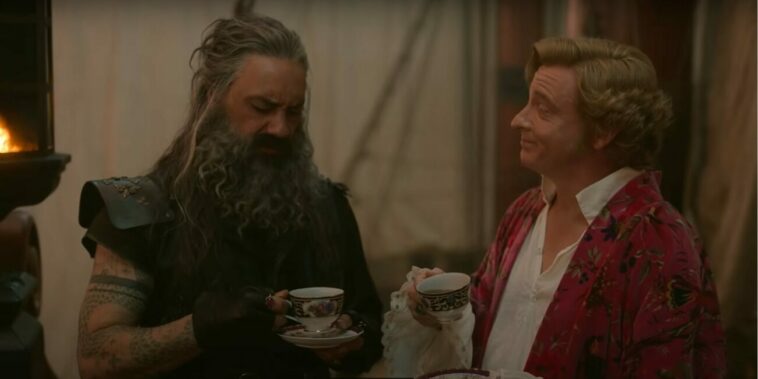We’re living in a time of oversaturation for the historical drama genre. I’m a known period drama enjoyer, and even I’ll admit that the sheer volume getting pretty overwhelming. Granted, this isn’t anything new. Here in the UK, costume dramas full of landed gentry melodrama and dramatic orchestral scores are a staple of Sunday night TV, something you can reliably throw on around the rest of your family and get very few complaints.
In recent years, however, there’s been a significant shift in the tone of our historical settings onscreen. The relatively stuffy format of upper-class Regency women in fancy dresses falling innocently in love with mysterious stable boys is still present, but it’s far less in fashion. The advent of successful shows like Outlander and Vikings, and the parallel ubiquity of gritty medieval fantasy series like Game of Thrones, ushered in an era of prestige historical media marketing itself as a raw, gritty depiction of the past.
A vision of history that claims to tell it like it is, putting twisted systems of violence and political intrigue front and centre, might have felt refreshing ten years ago, but at this point the novelty seems to be wearing thin. We’re harder to shock now; an onslaught of onscreen violence just doesn’t seem to be doing the trick anymore. A common draw of historical settings is their escapism, a respite from the hectic hypercapitalist landscape of modern life, but there’s little joy in retreating into the past in these shows. I don’t think I’ve had fun watching a period drama in ages. Or, I hadn’t, at least, until I saw Our Flag Means Death.
http://https://www.youtube.com/watch?v=xFE8ASwxmpA
David Jenkins’ swashbuckling comedy Our Flag Means Death has garnered a committed fanbase in the months since it aired. I may be a late viewer, but even so, it isn’t hard to see why. Put simply, it’s incredibly fun. A literal boatload of lovable pirates, all depicted as individuals with their own wants and fears instead of just glorified extras, is helmed by the affable Stede Bonnet, a nobleman abandoning his life of riches for the high seas. He captains his ship The Revenge with what I can only describe as misplaced summer camp leader energy. Of course, hijinks ensue. When the crew cross paths with the infamous Blackbeard, you’d expect things to take a darker turn, but the dread pirate’s relationship with Bonnet as the two break out of the roles socially imposed on them is the shamelessly beating heart of the show.
The show’s farcical tone isn’t the most original thing in the world, as it’s been used pretty frequently by star and executive producer Taika Waititi in projects like the Oscar-winning Jojo Rabbit. Against the backdrop of other historical dramas, though, it’s genuinely refreshing. Even pirate shows I’ve loved like Black Sails leaned heavily on the brutality of piracy, with our favourite characters going through agonising amputations and facing sexual violence deftly handled in the narrative. It isn’t that Our Flag Means Death never shows violence—the first episode sees an antagonist stabbed through the eye with his own sword—but it almost never feels included just for the sake of some grimdark quota. In fact, the mood whiplash between the show’s typical quick-fire comedic tone and some of its fight scenes makes the blood spatters we do see even more subversive, not less. Episode 5, for instance, opens with a brutal fight, the carved body of an antagonist forming a darkly comedic titlecard.
Another tonal joy in Our Flag Means Death is its little anachronistic touches. When done poorly, out-of-context modernity can draw viewers right out of a historical world. As popular as Bridgerton was, its score that half-embraced modern pop songs always threw me off. My take? Commit to your anachronisms, or don’t. Attention to historical accuracy can be immersive, but sometimes, putting that aside can provide new avenues for creative storytelling. The Episode 5 subplot about two crewmates deceiving the landed gentry by posing as descendants of Pharaohs is a perfect example of this. They use the profound racism of the upper crust against them, giving the comedy an edge of antiracist reclamation. On a simpler level, though, the literal pyramid scheme the two devise may not be accurate, but it’s a standout moment that wouldn’t have been possible if the show had maintained some drudging commitment to realism.
I half want to say that Our Flag Means Death doesn’t take itself too seriously, but I don’t think that’s true. The style of comedy, bewilderingly fast as a swordfight, certainly breathes light into the show, but this serves to keep the focus and gravity where it belongs: on the characters. There’s no dismissal of the love story at the show’s centre, and none of the queerbaiting tropes LGBT+ audiences have come to dread. If anything, the queer romance pairs excellently with the tone of the show in general: a little silly, a little stormy, but fundamentally joyous.

